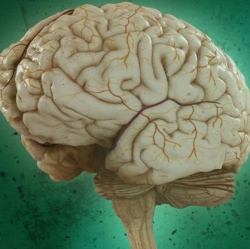
An international team of researchers has developed a biocompatible miniaturized wireless electronic device that can monitor temperature and pressure when implanted into the brains of mice, and then dissolve to be naturally resorbed into the soft tissue once they are no longer needed.
Electronic implants are used widely in the treatment of numerous medical conditions, ranging from pacemakers and defibrillators given to cardiac patients, electrode arrays used for deep brain stimulation in patients with Parkinson’s Disease, and devices used to monitor intracranial temperature and pressure inside the skulls of people with severe traumatic brain injuries.
Such devices are sometimes used for short periods of time, and often are implanted permanently. But implantation always carries some risk, the devices can be somewhat cumbersome and their wires and metallic components are breeding grounds for bacteria, so the implantation site can become infected. And removing the device, or replacing it if it malfunctions, involves another surgical procedure, and more distress, for the patient.
The new device, developed by a research team that includes engineers, materials scientists, and neurosurgeons in America and South Korea, and described in the journal Nature, could potentially overcome these limitations. It consists of a pressure and temperature sensor, each one smaller than a grain of rice, integrated on a biodegradable silicon chip that sits on the surface of the brain, and connected to a wireless transmitter attached to the outside of the skull.
